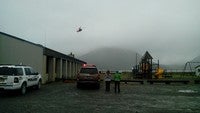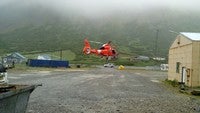News
Two Coast Guard Medevacs in One Day Emphasize King Cove’s Dire Need for Life-Saving Road
July 21, 2015

King Cove, AK – July 21, 2015 – The U.S. Coast Guard conducted two back-to-back medevacs in King Cove yesterday, rescuing two patients separately who were suffering from breathing problems. Fog and low visibility prevented the Coast Guard chopper from landing at the King Cove airstrip, so the MH 65 Dolphin helicopter landed in a parking lot at the old high school.
“We received a call just after 2 p.m. (July 20, 2015) requesting a non-maritime transport from the King Cove Clinic for a woman who had a severely obstructed airway,” said Petty Officer 2nd Class Grant DeVuyst with the U.S. Coast Guard 17th District Public Affairs. “We launched a helicopter from one of our Coast Guard cutters that was on patrol in the Bering Sea nearby. While the helicopter crew was on the way to King Cove, a second call came in for a gentleman who was at the King Cove Clinic having breathing difficulties.”
After completing the first medevac at about 4:40 p.m. and transferring the patient to Guardian Flight in Cold Bay, the Coast Guard refueled and returned to King Cove at about 5:30 p.m. to transport the second medevac patient to Cold Bay’s all-weather airport. Both times, the helicopter was prevented from landing at the King Cove airstrip.
“The old high school was a safer spot due to the low visibility of theDense fog prevented the Coast Guard from landing at the King Cove airstrip during both medevacs on July 20, 2015. Photo by Chris Babcock.King Cove airport, so we completed the transport from there,” DeVuyst said.
The Coast Guard said both medevacs to Cold Bay were completed just before 6:30 p.m. Guardian then transported the patients to Anchorage hospitals.
“We are so grateful the Coast Guard was able to come in to rescue these patients,” said Della Trumble, spokeswoman for the King Cove (Native) Corporation. “Without their help, both patients would have had to wait until the weather improved, putting their lives at risk. If we had a road connecting our community to the Cold Bay Airport, our EMS team would have been able to medevac the sick patients right away. In the meantime, the number of medevacs will continue to rise. We hope U.S. Interior Secretary Sally Jewell will understand this is an ongoing issue for our community, and the lives of the people in King Cove come first.”

The latest emergency medical evacuations in King Cove bring the total number of medevacs to 9 this year. Twenty-eight medevacs have occurred since Secretary Jewell rejected the life-saving road to Cold Bay’s all-weather airport in December 2013.
Background:
The people of King Cove have battled for more than three decades to get a life-saving road corridor linking the isolated community to the all-weather Cold Bay Airport, located just 25 miles away. The smallKing Cove Clinic Community Health Aide Bonita Babcock updates Coast Guard personnel on status of patients. Photo by Chris Babcock.stretch of road needed (approximately 11 miles) would connect to existing roads in the Izembek National Wildlife Refuge. The road would provide reliable and safe transportation to medevac seriously ill or injured patients during frequent periods of harsh weather when travel by plane or boat is too dangerous.
In 2009, Congress and the President approved the road and a massive land swap (61,000 acres from the State and the King Cove Corporation) in exchange for a small, 206-acre, single-lane gravel road corridor to the nearby all-weather Cold Bay Airport. Following an environmental impact statement, which King Cove residents believe was biased, U.S. Interior Secretary Sally Jewell rejected the road and land exchange just two days before Christmas 2013. On June 4, 2014, King Cove tribes, the corporation, the city and the Aleutians East Borough sued Jewell and other federal officials over the EIS and the road issue. Last month, the Senate Appropriations Subcommittee on Interior, Environment, and Related Agencies approved legislative language by Sen. Lisa Murkowski, R-Alaska, directing the Interior Department to do an equal-value land transfer to allow the construction of a connector road.
Contacts:
Laura Tanis – Communications Director, Aleutians East Borough
Office: (907) 274-7579; email: ltanis@aeboro.org